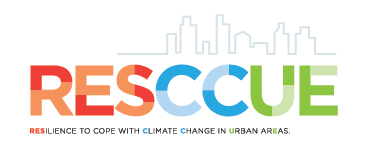
RESCCUE – RESCCUE – RESilience to cope with Climate Change in Urban arEas – a multisectorial approach focusing on water
Project Overview
The RESCCUE project aims to help urban areas around the world to become more resilient to climate change.
More precisely, RESCCUE will bring this objective to practice by providing innovative models and tools to improve the ability of cities to withstand and recover quickly from multiple shocks and stresses and maintain continuity of services.
RESCCUE delivers a forward looking, multi-scale, multisectorial and multi-hazard methodology. In order to interconnect the several sectorial models, the project takes advantage of the existent HAZUR® tool. The HAZUR® approach is based on a method and software (as a service) to help city decision makers and urban resilience professionals make fully informed and structured choices to make their cities more resilient analyzing the interdependencies between different city services, monitoring the city and simulating cascade effects in case of impacts that may affect the city. RESCCUE analyzes an interconnectedness of different urban systems, taking as starting point the water sector.
Project Results
The project is still ongoing. The desired impact of the project includes: i) Rapid large-scale deployment and market uptake of innovative technological and non-technological climate change adaptation solutions with high replicability.
ii) Contribution to the development of technological and performance standards for adaptation options.
iii) Improving innovation capacity and the integration of new knowledge
iv) Strengthening the competitiveness and growth of companies by developing innovations meeting the needs of European and global markets; and, where relevant, by delivering such innovations to the markets
v) Environmental and social impacts. The models and tools will be validated in three different cities, carefully selected by their representativeness of the European diversity in terms of climate type and city characteristics: Barcelona, Lisbon and Bristol.
Many reports and publications are available on the website.

